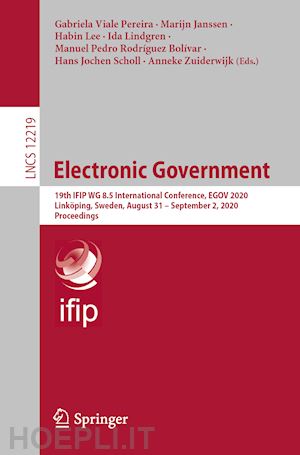
Questo prodotto usufruisce delle SPEDIZIONI GRATIS
selezionando l'opzione Corriere Veloce in fase di ordine.
Pagabile anche con Carta della cultura giovani e del merito, 18App Bonus Cultura e Carta del Docente
This book constitutes the proceedings of the 19th IFIP WG 8.5 International Conference on Electronic Government, EGOV 2020, held in Linköping, Sweden, in August/September 2020, in conjunction with the IFIP WG 8.5 IFIP International Conference on Electronic Participation (ePart 2020) and the International Conference for E-Democracy and Open Government Conference (CeDEM 2020). The conference was held virtually due to the COVID-19 pandemic.
The 30 full papers presented were carefully reviewed and selected from 118 submissions. The papers are clustered under the following topical sections: e-government foundations; e-government services and open government; open data: social and technical aspects; AI, data analytics, and automated decision making; and smart cities.
E-Government Foundations.- Between overexploitation and underexploitation of digital opportunities – a case study with focus on affordances and constraints.- Developing an analytical framework for analyzing and comparing national e-government strategies.- A Pathology of Public Sector IT Governance: How IT Governance Configuration Counteracts Ambidexterity.- Barriers and Drivers of Digital Transformation in Public Organizations: Results from a Survey in the Netherlands.- E-Government Services and Open Government.- Smart Policing: A Critical Review of the Literature.- Utilizing the investment instrument for digital transformation: A case study of a large Swedish municipality.- Service Quality through Government Proactivity: The Concept of Non-Interaction .- Automatization of Cross-Border Customs Declaration: Potential and Challenges. A Case Study of the Estonian Customs Authority.- AI-Enabled Innovation in the PublicSector: a Framework for Digital Governance and Resilience.- Systematic literature review: Technical Debt Management .- Measure what matters. A dual outcome service quality model for government service delivery.- Digital Inclusion Competences for Senior Citizens: the survival basics.- Walking a mile in their shoes—A citizen journey to explore public service delivery from the citizen perspective.- The role of domain-skills in bureaucratic service encounters.- Aligning stakeholder interests, governance requirements and blockchain design in business and government information sharing.- Approaches to Good Data Governance in Support of Public Sector Transformation through Once-only.- Governance challenges of inter-organizational digital public services provisioning: A case study on digital invoicing services in Belgium.- Open Data: Social and Technical Aspects.- A methodology for retrieving datasets from open government data portals using information retrieval and question and answering techniques.- Open Government Data from the Perspective of Information Needs - A Tentative Conceptual Model.- Towards a Framework for Open Data Publishers: A Comparison Study between Sweden and Belgium.- Open Government Data Systems: Learning from a Public Utility Perspective.- Collaboration in Open Government Data Ecosystems: Open Cross-sector Sharing and Co-development of Data and Software.- Towards Generic Business Models of Intermediaries in Data Collaboratives: From Gatekeeping to Data Control.- AI, Data Analytics, and Automated Decision Making.- Generating more value from government data using AI-An exploratory study.- Identifying risks in datasets for automated decision–making.- Using Government Data and Machine Learning for Predicting Firms’ Vulnerability to Economic Crisis.- Smart Cities.- Towards Data-Driven Policymaking for the Urban Heat Transition in the Netherlands: Barriers to the Collection and Use of Data.- Identifying Strategic Planning Patterns of Smart Initiatives. An Empirical Research in Spanish Smart Cities.- Demographical attributes explaining different stages of OG development in Spanish Local Governments.- Identification of competencies and teaching models for the governance of smart sustainable cities in the South American context.











Il sito utilizza cookie ed altri strumenti di tracciamento che raccolgono informazioni dal dispositivo dell’utente. Oltre ai cookie tecnici ed analitici aggregati, strettamente necessari per il funzionamento di questo sito web, previo consenso dell’utente possono essere installati cookie di profilazione e marketing e cookie dei social media. Cliccando su “Accetto tutti i cookie” saranno attivate tutte le categorie di cookie. Per accettare solo deterninate categorie di cookie, cliccare invece su “Impostazioni cookie”. Chiudendo il banner o continuando a navigare saranno installati solo cookie tecnici. Per maggiori dettagli, consultare la Cookie Policy.